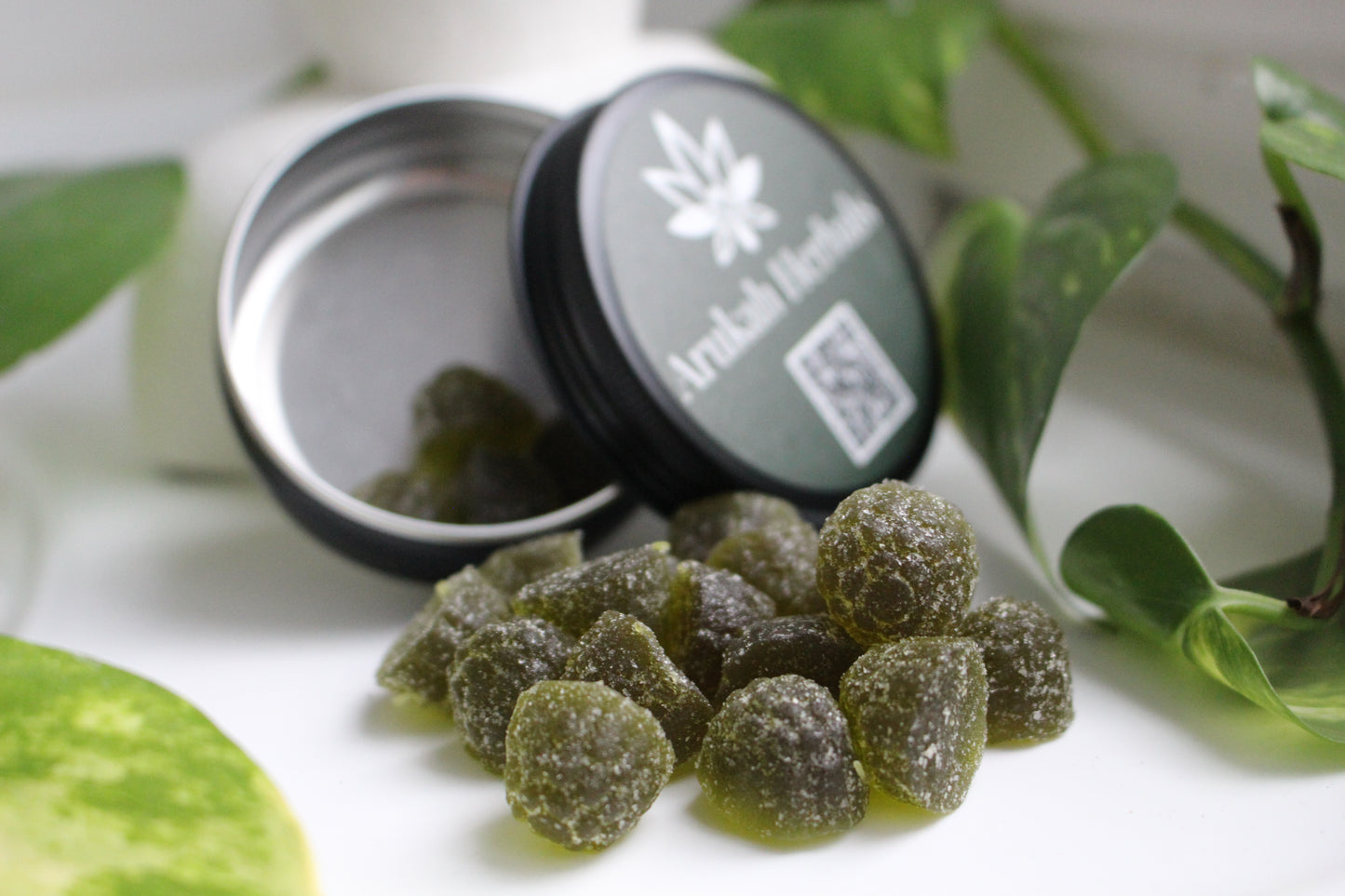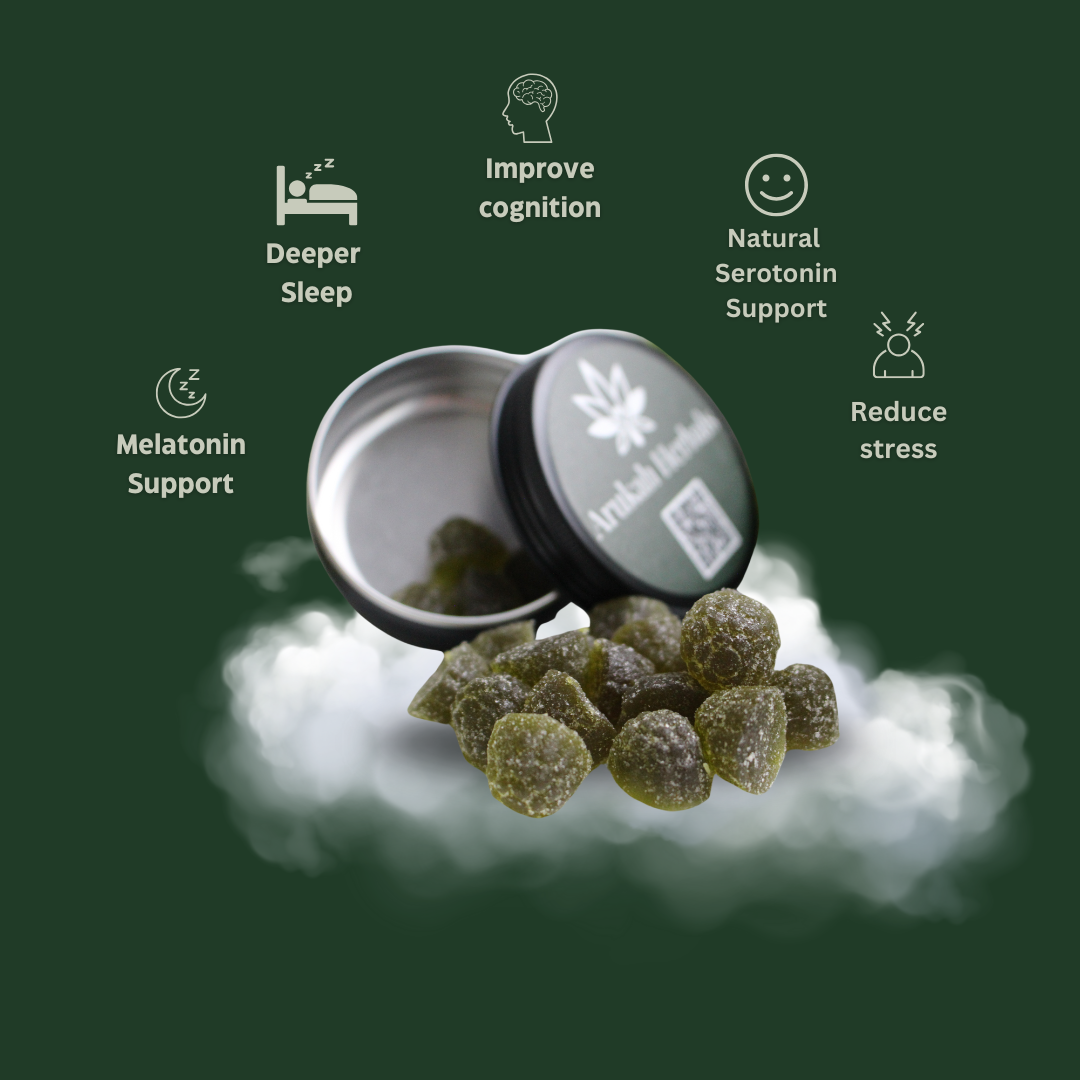
Best remedies for ADHD that are natural: The Benefits of L-Theanine, 5-HTP, and Passionflower for ADHD
Share
Best remedies for ADHD that are natural: The Benefits of L-Theanine, 5-HTP, and Passionflower for ADHD
Arukah Herbals gummies combines some of the best nootropic and herbal ingredients into one convenient and delicious tasting gummy to take the complexity out of supplement shopping and get you feeling more clam, focused and sleeping better today!
Find out how our unique blend of gummies can work for you if you are struggling through ADHD. You can use these gummies in conjunction with your ADHD medication.
Click the link to shop:
The Benefits of L-Theanine, 5-HTP, and Passionflower for ADHD

Attention Deficit Hyperactivity Disorder (ADHD) is a neurodevelopmental disorder that seems to be getting more common all around the world in both men, women and children as time goes on. If someone has ADHD they can potentially experience short attention or lack of attention, little impulse control and overstimulation/high activity. If you are someone with ADHD or have a loved one who has just been diagnosed, there are some excellent and effective natural remedies available on the market now. 3 out of our 8 awesome ingredients in the gummies include: L-theanine, 5-HTP, and Passionflower. These have all strong evidence and results in managing ADHD symptoms by targetting neurotransmitter imbalances and promoting mental clarity, relaxation, and emotional balance.
1. L-Theanine: Promoting Relaxation and Mental Clarity
L-theanine is an amino acid found in green tea and is known for its soothing effects on the brain. Studies suggest that L-theanine enhances alpha brain wave activity, which is related with relaxed yet alert mental states, those that struggle to maintain focus and calmness may benefit from L-Theanine in this way.
L-Theanine acts on key neurotransmitters in the brain such as Serotonin, Dopamine and GABA. These neurotransmitters play vital roles in regulating mood, attention, and stress. By regulating the release of these brain chemicals, L-theanine supports a reduction in feelings of anxiety and overstimulation, which are common with ADHD. If you have an overactive mind, L-Theanine may be able to provide you some relief in your daily struggles.
Scientific Research:
A study published in the Journal of Clinical Psychiatry in 2011 explored the effects of L-theanine on cognitive performance and anxiety. The research found that L-theanine supplementation improved attention and focus in individuals with mild anxiety, a condition often co-occurring with ADHD. Furthermore, another study in Biological Psychology (2007) reported that L-theanine helped promote a relaxed but alert state, supporting mental clarity without sedation, which is a common challenge for those with ADHD.
2. 5-HTP: Enhancing Mood and Focus
5-Hydroxytryptophan (5-HTP) is a naturally occurring amino acid and chemical precursor to serotonin, a neurotransmitter that helps regulate mood, sleep, and attention. ADHD is often linked to imbalances in neurotransmitter systems, particularly dopamine and serotonin. Low serotonin levels can contribute to irritability, anxiety, and poor focus, making 5-HTP a potentially valuable supplement for ADHD management.
By increasing serotonin levels in the brain, 5-HTP may help alleviate symptoms of anxiety and depression, which are common in individuals with ADHD. Additionally, serotonin plays a role in cognitive functions like memory and focus, so boosting serotonin levels may enhance attention and reduce the impulsivity that often accompanies ADHD.
Scientific Research:
A study published in Journal of Attention Disorders (2011) looked at the relationship between serotonin levels and ADHD symptoms. The researchers found that individuals with ADHD often have lower serotonin activity, which can worsen impulsivity and inattention. Furthermore, 5-HTP has been shown to be effective in promoting serotonin production and improving mood, both of which are beneficial for ADHD patients. While research directly connecting 5-HTP to ADHD is limited, these findings support its potential as an adjunct therapy for managing ADHD symptoms.
3. Passionflower: Reducing Anxiety and Improving Sleep
Passionflower (Passiflora incarnata) is a plant that has been traditionally used for its calming effects. It works primarily by enhancing the activity of gamma-aminobutyric acid (GABA), an inhibitory neurotransmitter that reduces neuronal excitability and promotes relaxation. For individuals with ADHD, who often struggle with overactive thoughts, impulsivity, and emotional dysregulation, passionflower may help bring a sense of calm and balance.
Passionflower’s ability to reduce anxiety and improve sleep quality can also be particularly beneficial for ADHD patients. Anxiety is a common comorbidity with ADHD, and poor sleep exacerbates symptoms such as inattention and irritability. By improving sleep and reducing stress, passionflower can help improve overall cognitive function and emotional regulation in individuals with ADHD.
Scientific Research:
A study published in Phytotherapy Research (2010) compared the effects of passionflower to a benzodiazepine medication, oxazepam, in individuals with generalized anxiety disorder (GAD). The results showed that passionflower was equally effective in reducing anxiety, with fewer side effects. Another study, published in BMC Complementary and Alternative Medicine (2013), showed that passionflower improved sleep quality in individuals with insomnia, which is often co-occurring in ADHD.
Combining L-Theanine, 5-HTP, and Passionflower for ADHD
The combined effects of L-theanine, 5-HTP, and passionflower offer a promising natural approach to managing ADHD symptoms. L-theanine can promote focus and mental clarity, 5-HTP can enhance mood and attention by boosting serotonin levels, and passionflower can reduce anxiety and improve sleep quality. Together, these natural compounds may address multiple aspects of ADHD, from cognitive function to emotional regulation and sleep, with fewer side effects than traditional stimulant medications.
Conclusion
While the research on L-theanine, 5-HTP, and passionflower specifically for ADHD is still in the early stages, the individual benefits of each supplement in promoting calmness, improving focus, and balancing mood make them potential complementary treatments for ADHD. As a natural alternative, these compounds offer a holistic approach to managing symptoms without the risk of dependency or harsh side effects commonly associated with stimulant medications. As always, individuals considering natural supplements should consult with a healthcare provider to ensure they are a suitable option for their unique needs and circumstances.







